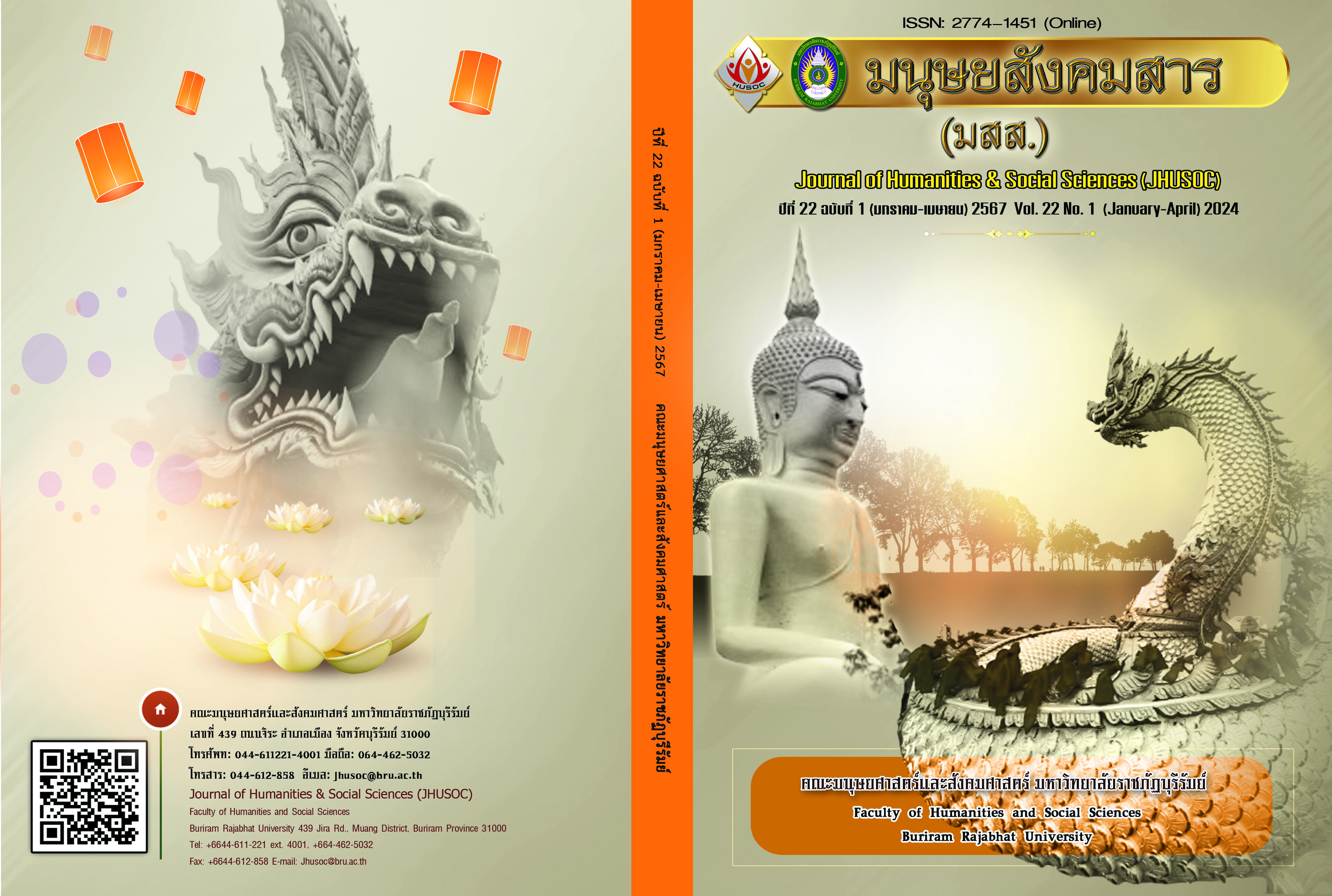Development of English Conversation Drama Practice Exercises to Enhance First-Year Students English-Speaking Proficiency
Main Article Content
บทคัดย่อ
The study examined the impact of English conversation drama practice exercises on the English-speaking proficiency of first-year university students learning English as a foreign language (EFL). Focused on practical and professional conversational skills within the "English for Life and Work" course, the research gathered insights from students in the upper northeastern region of Thailand during the first semester of 2023. Participants were intentionally selected from five cohorts, totaling 500 students enrolled in the course. Data analysis involved percentage analysis, calculating the mean, assessing standard deviation, and continuous testing. The findings revealed that prior to the intervention, the experimental group exhibited a high level of English speaking ability, with an average rating of 3.86. However, only 13.3% of students demonstrated admirable speaking abilities. Following the intervention, an impressive 93.3% of students achieved a 'very good' level of English speaking proficiency. An extensive assessment of students' speaking skills before and after the experiment showcased a significant improvement, surpassing their initial proficiency levels. These results underscore the effectiveness of English conversation drama practice exercises in substantially enhancing students' English-speaking skills, with statistical significance observed at the .05 level.
Article Details

อนุญาตภายใต้เงื่อนไข Creative Commons Attribution-NonCommercial 4.0 International License.
เนื้อหาและข้อมูลในบทความที่ลงตีพิมพ์ในวารสารทดสอบระบบ ThaiJo2 ถือเป็นข้อคิดเห็นและความรับผิดชอบของผู้เขียนบทความโดยตรงซึ่งกองบรรณาธิการวารสาร ไม่จำเป็นต้องเห็นด้วย หรือร่วมรับผิดชอบใดๆ
บทความ ข้อมูล เนื้อหา รูปภาพ ฯลฯ ที่ได้รับการตีพิมพ์ในวารสารทดสอบระบบ ThaiJo2 ถือเป็นลิขสิทธิ์ของวารสารทดสอบระบบ ThaiJo2 หากบุคคลหรือหน่วยงานใดต้องการนำทั้งหมดหรือส่วนหนึ่งส่วนใดไปเผยแพร่ต่อหรือเพื่อกระทำการใดๆ จะต้องได้รับอนุญาตเป็นลายลักอักษรจากวารสารทดสอบระบบ ThaiJo2 ก่อนเท่านั้น
เอกสารอ้างอิง
Baker, W., & Jarunthawatchai, W. (2017). English language policy in Thailand. European Journal of Language Policy, 9(1). 27–44.
https://doi.org/10.3828/ejlp.2017.3.
Bessadet, L. (2022). Drama-based approach in English language teaching. Arab World English Journal, 13(1). 525–533.
https://doi.org/10.24093/awej/vol13no1.34
Bora, S. F. (2020). Curtain Up! Enhancing L2 spontaneous and authentic speaking oportunities through play scripts and drama-based approaches. RELC Journal, 52(3). 458–473. https://doi.org/10.1177/0033688219887536.
Galante, A., & Thomson, R. I. (2016). The effectiveness of drama as an nstructional approach for the development of second language oral fluency, Comprehensibility, and accented ness. TESOL Quarterly, 51(1). 115–142. https://doi.org/10.1002/tesq.290.
Galante, A. (2018). Drama for L2 speaking and language anxiety: Evidence from Brazilian EFL learners. RELC Journal, 49(3). 273–289.
https://doi.org/10.1177/0033688217746205
Gill, C. (2013). Enhancing the English-language oral skills of international students through drama. English Language Teaching, 6(4). 29-41. https://doi.org/10.5539/elt.v6n4p29.
Housen, A., De Clercq, B., Kuiken, F., & Vedder, I. (2018). Multiple approaches to complexity in second language research. Second Language Research, 35(1). 3–21. https://doi.org/10.1177/0267658318809765
Mohamad Nor, N., & Rashid, R. A. (2018, January). A review of theoretical perspectives on language learning and acquisition. Kasetsart Journal of Social Sciences, 39(1). 161–167. https://doi.org/10.1016/j.kjss.2017.12.01
Robinson, P. (2007). Designing and conducting mixed methods research. Australian and New Zealand Journal of Public Health, 31(4), 388. https://doi.org/10.1111/j.1753-6405.2007.00096.x
Souzandehfar, M., & Ahmed Abdel-Al Ibrahim, K. (2023, November 29). Task-supported language instruction in an EFL context: Impacts on academic buoyancy, self-esteem, creativity, and language achievement. Asian-Pacific Journal of Second and Foreign Language Education, 8(1). https://doi.org/10.1186/s40862-023-00218-0
Tantiwich, K., & Sinwongsuwat, K. (2021). Thai university students’ problems of language use in English conversation. LEARN Journal: Language Education and Acquisition Research Network, 14(2), 598-626.
Tremblay, A. (2011). Proficiency assessment standards in second language acquisition research. Studies in Second Language Acquisition, 33(3), 339–372. https://doi.org/10.1017/s0272263111000015
Vaishnavi S., & Ajit I, D. (2023, July 12). The effectiveness of drama-based approaches in improving speaking skills among first generation ESL learners: An experimental study. International Journal of Social Science and Human Research, 06(07). https://doi.org/10.47191/ijsshr/v6-i7-22


